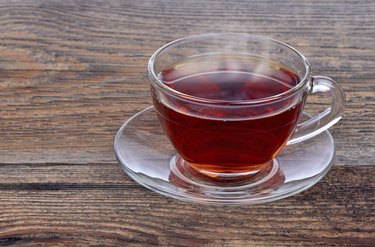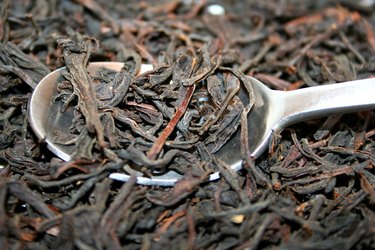
Strong, tart and malty with a dark reddish brown color, Assam tea is named after the Assam region of northeast India, the world's largest tea growing region. Assam tea is classified as a type of black tea and is commonly referred to as English breakfast or Irish breakfast tea.
Mental Alertness
Video of the Day

The caffeine content of Assam tea affects thinking and alertness. Assam tea helps you stay awake even if you are experiencing an extended period without sleep. The caffeine, however, can cause side effects if consumed in large quantities, warns MedlinePlus. Avoid adverse effects of caffeine, such as headaches, nervousness, irregular heart beat, heart burn and irritability, by drinking fewer than five cups per day.
Video of the Day
Cancer Prevention

The phenolic compounds in Assam tea have antioxidant properties and function to reduce the damage of reactive oxygen and nitrogen species on your cells. This means Assam tea may be responsible for reducing the risk of cancer, though further research is needed to confirm this. MedlinePlus states that black tea is possibly effective for lowering the risk of ovarian cancer. Preliminary evidence suggests that men who consume more phytoestrogens, which are found in black tea, have a lower risk of getting lung cancer. Tea may be ineffective, however, for reducing the risk of stomach, colon, rectal and breast cancer.
Cardiovascular Health

The flavonoids in tea improve endothelial function -- the function of the lining inside the blood vessels, cardiac valves and other body cavities. According to a 2010 article published in "Molecular Aspects of Medicine," flavonoids from either green or black tea prevent the build up of plaque inside the arteries. Thus, tea is associated with reduced risk of cardiovascular disease. MedlinePlus rates this tea as possibly effective for reducing the risk of hardening of the arteries, especially in women. Some evidence suggests that drinking black tea is also associated with a lower risk of heart attack.
Decreased Risk of Parkinson’s Disease

Drinking Assam tea – or any beverage with caffeine – may decrease your risk of developing Parkinson's disease. For men, consuming 124 to 208 milligrams of caffeine per day -- about two to four cups of Assam tea -- significantly reduces the risk of Parkinson's, while higher consumption provided a greater reduction of risk. For women, one to four cups of tea seemed to provide the greatest risk reduction, reports MedlinePlus.